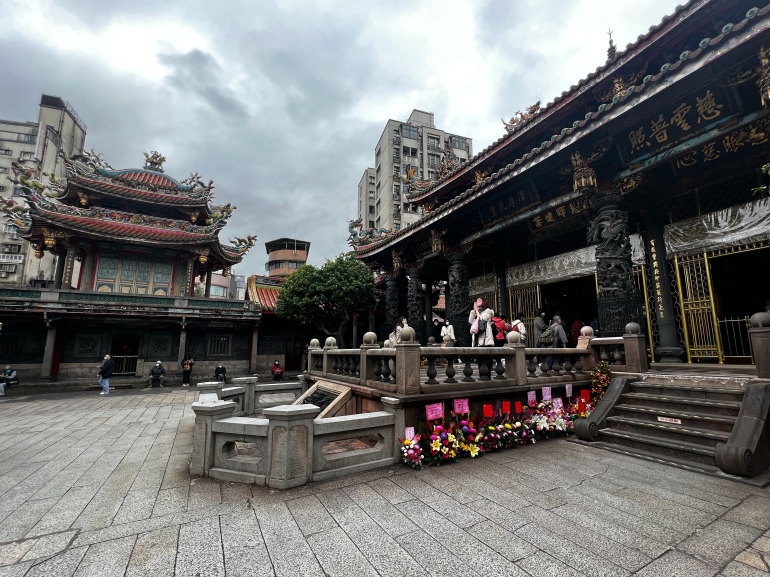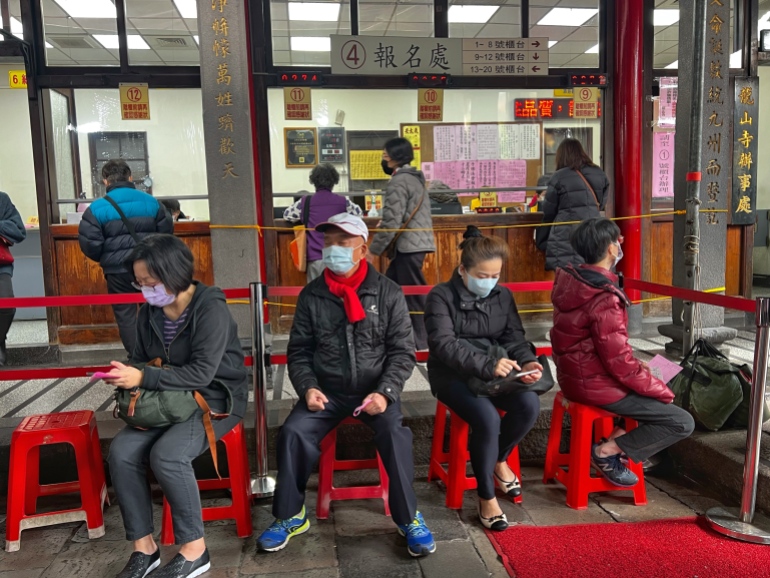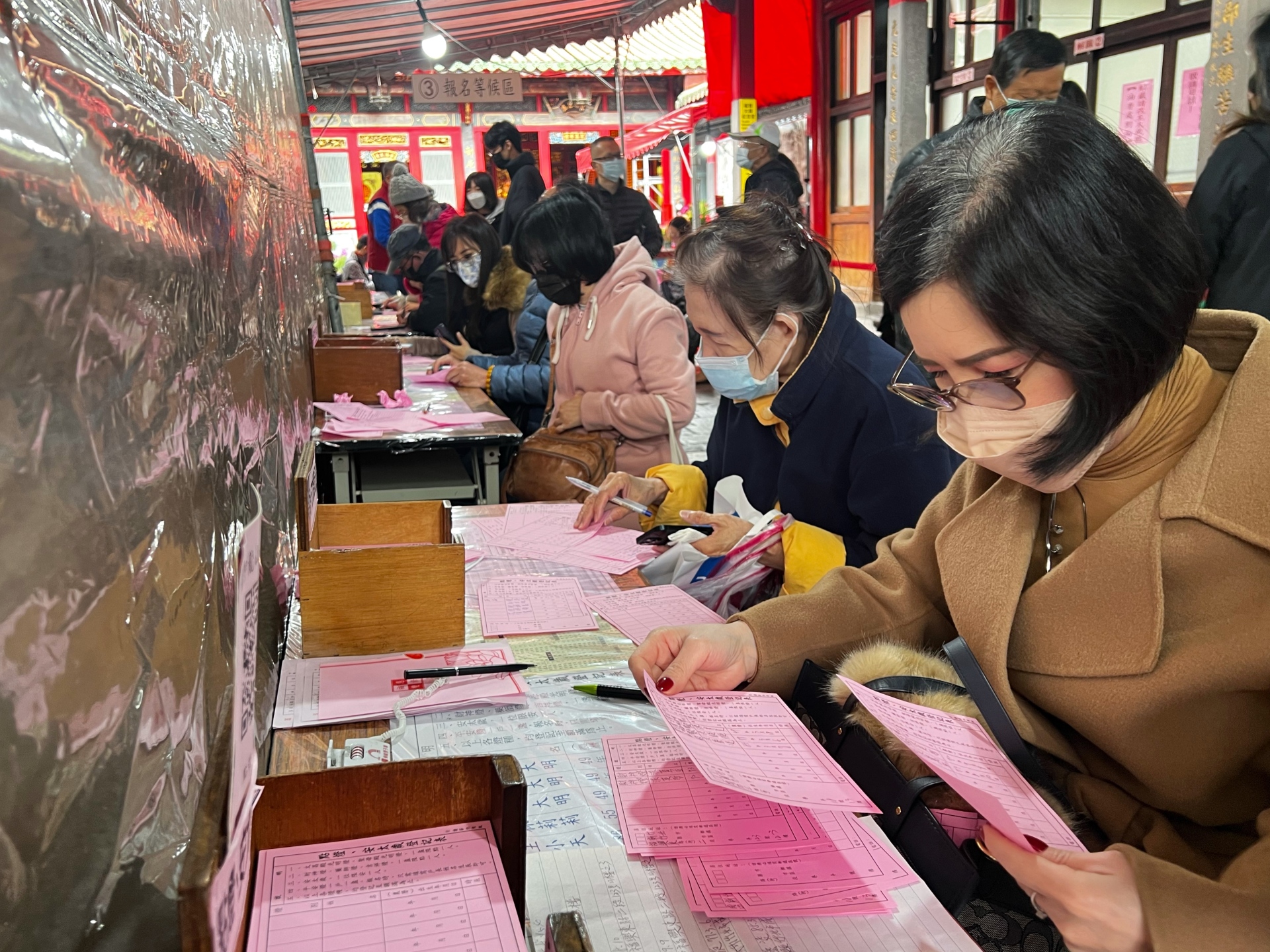Taipei, Taiwan – Preparing for the Lunar New Year is a busy time for people like Ms Lin, a 58-year-old who works near Taipei’s historic Longshan Temple.
Many Taiwanese – and people of Chinese descent throughout the world – get their hair cut, buy new clothes, clean out the house, prepare for a family feast or travel back home in the run-up to the festival, which this year falls on Sunday. But many also find time to visit their local temple to pray to gods and ancestors and ward off anything untoward lurking in the year ahead.
This is where Al Jazeera found Ms Lin one weekday afternoon, queueing to light lamps to the Taoist god of money, and the tai sui, the rotating god of the year, lest he brings her family misfortune.
Ms Lin had completed a form with details including information like her age, birthday, and address – important identifiers in Taoism’s “celestial bureaucracy” – to hand to temple office staff so the gods can identify each mortal. These days, lamps can be paid for with cash or a credit card.
“It’s like [Christians] have Christ that they can confess to. When they have some worries on their mind, they will seek help from God,” Ms Lin, who preferred not to share her full name, told Al Jazeera. “So, we spend a bit of money and ask the [tai sui] god to read out our birthday and to keep us safe. It’s actually very similar.”

Longshan Temple is open year-round, but praying to the tai sui – a ritual known as “an tai sui” – is particularly important ahead of the Lunar New Year. In Taoist tradition, people born under the zodiac sign of the upcoming year – such as 2023’s Year of the Rabbit – face 12 months of potential bad luck and struggle because they will clash with the year’s tai sui.
This year, the tai sui is General Pi Shi – a deity linked to the martial arts who is thought to have lived during the time of the northern Wei dynasty from about 300-500 CE. There are 60 tai sui altogether and they rotate through each lunar new year.
Ms Lin’s husband was born in the Year of the Rabbit, so he will need to take care, but so will people born under the rooster, dragon, rat and horse, according to Chinese astrology.
The 58-year-old tells Al Jazeera she is performing an an tai sui just to be safe.
“I anticipate something bad could happen,” she said. “Or if something bad happens, I would feel like it’s because I didn’t an tai sui this year.”
Astrology taken seriously
Besides lighting a lamp, other ways to appease the tai sui include leaving small offerings like joss paper, incense, food and flowers, according to Marco Lazzarotti, a cultural anthropologist at the Institute of Ethnology of the University of Heidelberg in Germany.
Practitioners may also pay attention to feng shui, an ancient Chinese art that aims to harmonise people with their environment and requires people to consider the orientation of their home and the placement of objects within it.
That means that as the tai sui General Pi Shi faces in an easterly direction, it is important to not block that path, Lazzarotti said, while furniture should also avoid both orientations.
Clashing with the tai sui, known as “fan tai sui,” may sound something like “Mercury in retrograde” – a period of time the planet appears to be backwards and tied to feelings of frustration and bad luck in Western astrology.
In 2023, Mercury will be in retrograde three times for a period of about four weeks, but fan tai sui lasts the entire year.
More significantly, however, may be that while the Western zodiac is viewed as something of a superstition (and fodder for Instagram or TikTok) largely divorced from its ancient Babylonian, Egyptian and Greek roots, Taoism and Chinese astrology, by contrast, are taken seriously, with long lines forming at the Longshan Temple in the days running up to the new year.
Official estimates for how many Taiwanese practise Taoism vary from between 30 to 80 percent, a figure that is hard to pin down because it is often blended with Mahayana Buddhism, Confucianism and folk beliefs that migrated to Taiwan from China. In some cases, deities may perform double duty as both Buddhist bodhisattva and Daoist god, like Guanyin, the goddess of mercy.
These beliefs, known broadly as “Chinese folk religion,” have spread beyond Taiwan to Southeast Asia and other overseas Chinese communities, although they were briefly eradicated in mainland China during the tumult of the Cultural Revolution.
In the 21st century, many of these practices have also gone online and followers can apply to have a lamp lit for the god of their choice at some local temples.
Despite the widespread practice of such beliefs, how deep they run usually varies from person to person, and they still retain some popularity with younger generations. One temple staff member told Al Jazeera he was processing 200 forms a day, which was slow compared with some of the other 11 clerks on duty.

Also noticeably busy was Longshan Temple’s shrine to Yue Lao, the god of love, which was buzzing with younger visitors praying with incense or asking questions.
For other Taiwanese, like Emily, a 17-year-old also queueing to pray for her mother, a “rabbit”, and good exam results, practices like an tai sui are more tradition than belief.
“To my family it is definitely part of their religious beliefs but to me, it’s more of a cultural practice,” the teenager, who did not want to share her full name, told Al Jazeera.
“Most of my classmates will go an tai sui with their family. If the zodiac signs happen to clash, the whole family will go together, so I think this tradition will continue.”
Sumber: www.aljazeera.com
 Skip to content
Skip to content

